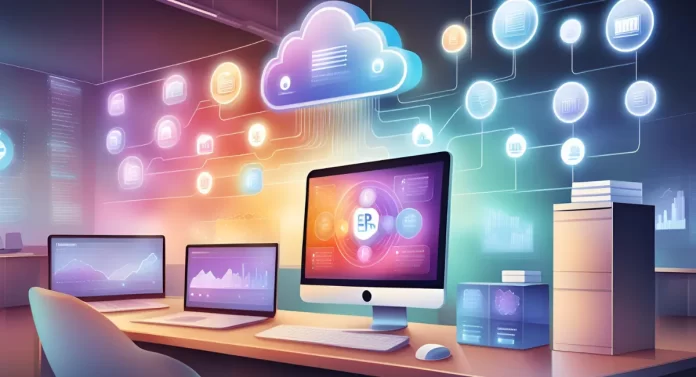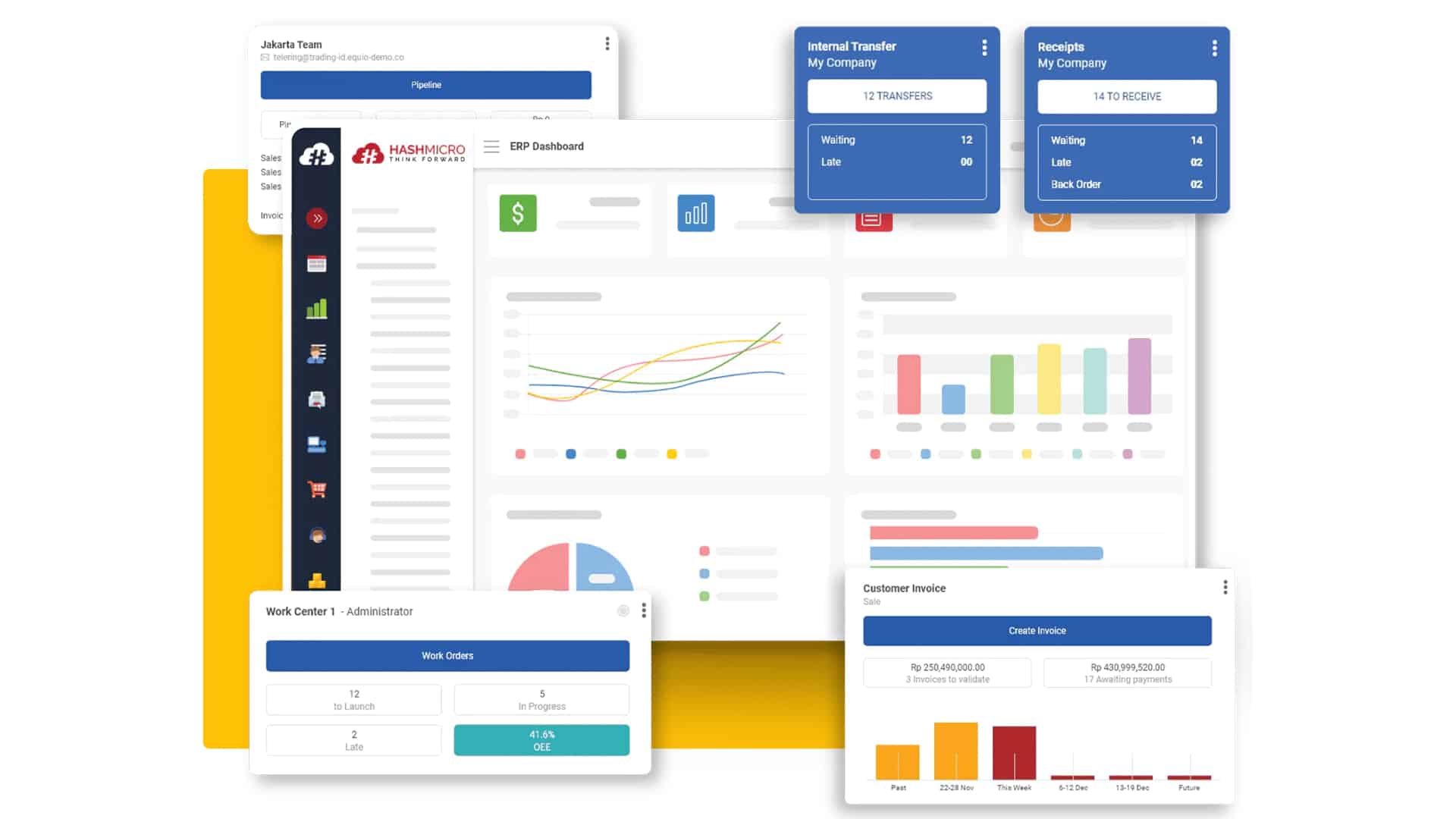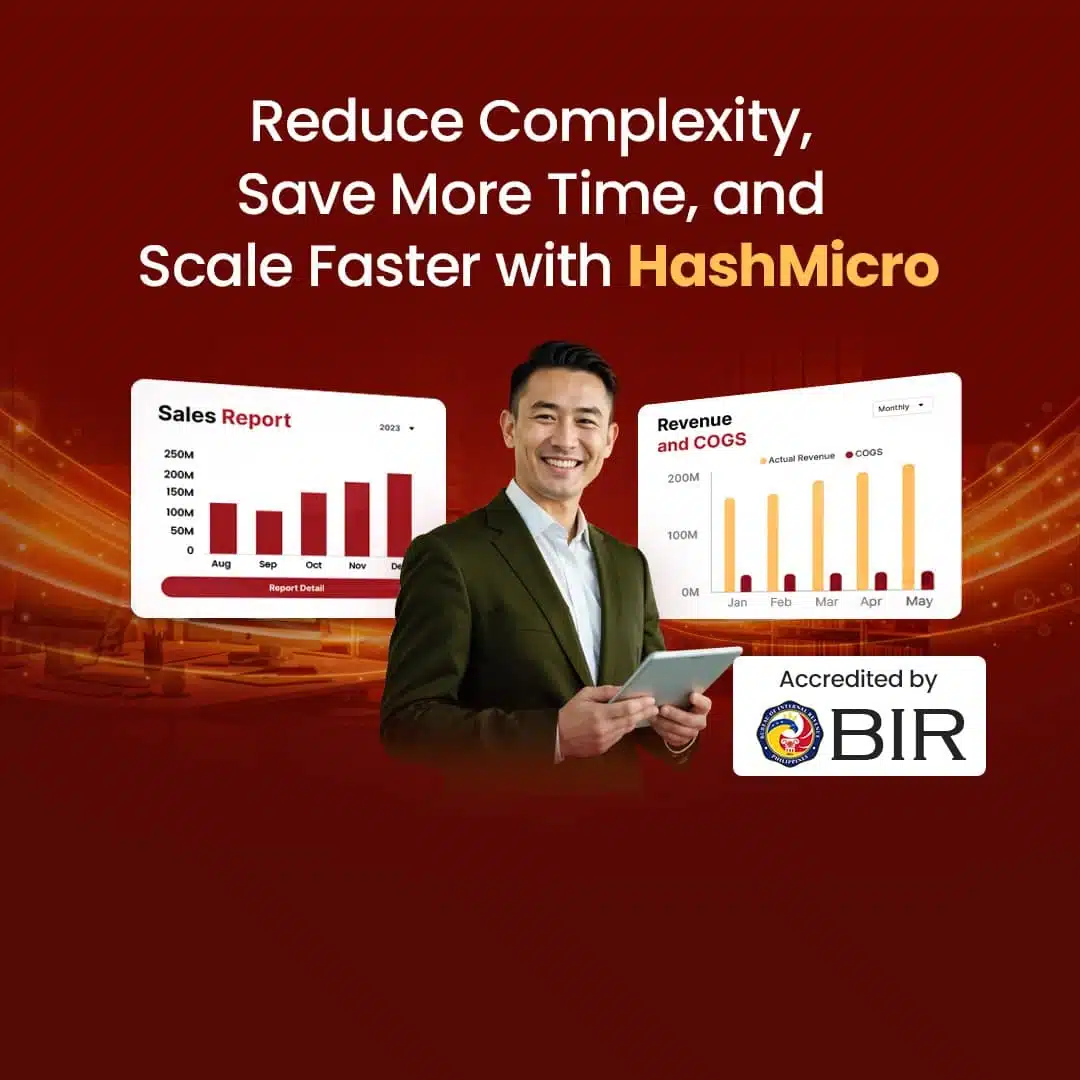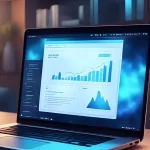Utilizing an ERP system is not just an option but a necessity for businesses seeking to streamline operations. Without an ERP system, companies can face difficulty synchronizing activities across divisions, leading to miscommunication and data mismatches. These issues can disrupt business processes, cause delays in decision-making, and ultimately impact a company’s bottom line.
ERP systems enhance operational efficiency and decision-making by integrating critical finance, HR, manufacturing, and supply chain processes into a single platform. This integration ensures that all divisions operate with consistent and accurate data, thus improving coordination and reducing errors.
This article will explore the different types of ERP systems example, their various classifications and deployment models, and provide insights on choosing the system that best suits a business’s unique needs.
Key Takeaways
|
Table of Contents

What is an ERP System and Its Benefits for Business?
Enterprise Resource Planning are integrated software platforms that companies use to manage and automate many of the essential functions of their business operations. These systems automate repetitive tasks and streamline complex processes, reducing the need for manual intervention and minimizing the risk of errors.
Here are some of the key benefits of implementing an ERP system in your business:
- Automation of repetitive tasks
- Minimization of errors
- Improved decision-making
- Better resource management
- Scalable and easily adjusted to accommodate business growth.
- Regulatory compliance and reporting
These benefits of ERP systems collectively contribute to a more streamlined, efficient, and effective operational environment within any business.
Types of ERP Systems
The landscape of ERP systems is diverse, with various systems tailored to different business sizes and needs. Here, we will explore three primary classifications: ERP by tier, ERP by deployment model, and ERP based on business needs.
Types of ERP by tier
Understanding the different types of ERP systems based on organizational tiers is essential. This categorization helps businesses determine the level of system complexity and customization they require based on their size and operational scope.
- Tier 1 ERP: These systems are designed for large multinational corporations that require extensive functionality to manage complex, global operations. They support various languages and currencies and comply with multiple international regulations.
- Tier 2 ERP: These systems balance functionality and flexibility well. While they are less complex than Tier 1 systems, they still provide comprehensive features necessary for businesses looking to expand or streamline their operations effectively.
- Tier 3 ERP: These systems target businesses with less complex operations. They are typically easier to implement and maintain, offering basic ERP functionalities at a more affordable price, making them suitable for startups and small enterprises.
Types of ERP by deployment model
It is crucial to understand that how an ERP system is deployed can significantly impact its performance, scalability, and suitability for a business is crucial. Let’s explore these in more detail to help you determine which deployment model aligns best with your business requirements and strategic goals.
Cloud ERP
Cloud ERP, or Cloud-based Enterprise Resource Planning software, is a system hosted and managed by cloud-based data center vendors. These vendors are responsible for the applications, databases, operating systems, servers, and updates, including security, antivirus, and feature enhancements such as disaster recovery.
Pros:
- Accessibility and flexibility
- Regular updates
- Inter-module integration
- Cloud backups are available if data is lost
Cons:
- Requires a stable internet connection
On-premises ERP
On-premises ERP systems are types of ERP installed locally on a company’s computers and servers. This model gives businesses complete control over their ERP infrastructure, including how the system is implemented, managed, and secured. Companies opt for on-premises ERP primarily for reasons related to data control and system customization.
Pros:
- Complete control of the ERP system
- Robust data security
- Independent of the internet stability
Cons:
- High costs for servers and hardware
- Risk of data loss
Hybrid ERP
Hybrid ERP is types of ERP that combines elements of both cloud and on-premises systems. It allows businesses to keep some of their ERP applications and data on local servers while moving others to the cloud. This model enables businesses to leverage the cloud’s scalability and cost-efficiency while maintaining critical functions on-premises for control and security.
Pros:
- It features a fallback mechanism that switches to a local server during internet disruptions and syncs data to the cloud when connectivity is restored.
Cons:
- Real-time data synchronization cannot be continuously performed
- It can only be implemented in specific modules
- Potential data conflicts between online and offline modes
Types of ERP based on business needs
Each business faces challenges and requirements, and understanding ERP systems based on business needs is crucial. This understanding will help companies select an ERP solution that not only fits their current operational scope but also supports their specific industry demands and growth aspirations.
Enterprise ERP
Enterprise ERP systems are types of ERP that can be deployed as cloud-based or on-premise solutions. These systems are highly configurable and integrate multiple business processes, providing a comprehensive toolset designed for large businesses.
Pros:
- Flexible and customizable
- Comprehensive features
- Hosting options (cloud-based and on-premise)
- Multi-module integration
- Optimal ROI
Cons:
- Involves substantial upfront costs, ongoing licensing fees, and maintenance expenses
SaaS ERP
SaaS ERP, or Software as a Service ERP, is a cloud-based system that integrates business processes digitally via the Internet. This model allows businesses to use the ERP software on a subscription basis.
Pros:
- Cost-effective due to lower startup costs and a subscription-based model
- Quick implementation
- Easily adjusts to the size of the business
Cons:
- Limited flexibility and customization
- It may become insufficient for large enterprises
Custom / In-House ERP
Custom or in-house ERP systems are types of ERP that are built from scratch to meet specific business requirements. These systems are developed internally by the company’s IT team or through specialized developers.
Pros:
- Total system control
- Enhanced data security
Cons:
- Significant budget and IT readiness required
- Includes costs for developers, servers, maintenance, and potentially third-party services
- High risk of implementation failure
- Longer time to ROI
What Business Functions Can be Optimized with ERP?
Enterprise Resource Planning (ERP) systems optimize critical business functions, integrating them into a unified platform to enhance efficiency and decision-making. Here are some business functions that can be optimized with an ERP system:
- Accounting: ERP systems streamline processes such as ledger management, budgeting, and financial reporting, improving financial management.
- Human resources: ERP simplifies HR tasks, including payroll, benefits management, and employee data management, enhancing efficiency and accuracy.
- Supply chain management: ERP systems optimize inventory control, procurement, and logistics, ensuring efficient and cost-effective product delivery.
- Customer relationship management: ERP integrates customer management tools to enhance interactions and customer satisfaction.
- Manufacturing: Supports manufacturing operations with production scheduling, quality control, and maintenance management.
- Project management: ERP systems offer tools for project planning, resource allocation, and progress tracking, enabling managers to deliver projects on time and within budget.
By optimizing these critical functions, ERP systems help businesses operate more smoothly, reduce costs, and enhance overall performance, making them essential tools for modern business management.
Signs That Your Business Needs ERP Systems
Staying ahead of operational challenges and market changes is crucial when running a business. Recognizing that your business may need an ERP system can be the key to making timely decisions that propel your organization forward. Here are several signs that indicate your business might be ready to benefit from implementing an ERP system:
- Data management difficulties: If managing data across various departments becomes challenging and inconsistencies arise, an ERP system can help centralize and streamline data management.
- Inefficient processes: If manual tasks and redundancies slow down your operations, an ERP system can automate these processes, enhancing efficiency and reducing errors.
- Difficulty in scaling operations: If your current system struggles with the increasing complexity of operations as your business grows, an ERP system can provide the scalability you need.
- Compliance issues: For businesses facing regulatory challenges, especially across different regions, ERP systems can ensure compliance by aligning operations with legal standards.
- Inadequate reporting and planning: If generating accurate and timely reports is becoming increasingly tricky, ERP systems offer advanced analytics and real-time insights to aid decision-making.
- Customer service challenges: If operational inefficiencies, such as order errors or inventory issues, hinder customer satisfaction, an ERP system can integrate customer management tools to improve service.
Considering an ERP system could be a transformative step for your business. It offers a streamlined approach to operations and strategic planning. By addressing these critical areas, an ERP system supports day-to-day activities and ensures your business remains competitive and responsive in a fast-paced market.
HashMicro as an All-in-One ERP Solutions
HashMicro ERP Software is a robust platform that integrates various business functions into a single, unified system, facilitating smoother operations across departments. The software enhances visibility, improves data accuracy, and allows for real-time decision-making, which is essential for modern business management.
As a principal company, HashMicro offers a standardized system that ensures businesses operate following relevant regulations. This aspect is particularly crucial for companies in industries where compliance with legal and regulatory standards is mandatory.
HashMicro’s reliability and credibility are underscored by its adoption across various prominent industries. Notable clients such as Hino, Danone, Changi Airport Group, and Abbott rely on HashMicro for their ERP needs, reflecting the system’s capacity to handle complex, large-scale operations.
Let’s explore how HashMicro ERP can enhance your business operations:
- Built-in Business Intelligence (BI): HashMicro ERP includes an integrated BI tool that supports extensive data analysis, facilitating improved decision-making. This feature allows businesses to generate data visualizations and real-time reports, providing key insights at a glance.
- Adaptive and Easy to Customize: HashMicro ERP is adaptable and customizable, making it suitable for various industries. It evolves with business trends and allows extensive modifications to meet specific operational needs.
- Industry-Ready: HashMicro ERP is equipped with specialized modules optimized for various industries’ needs. This ensures businesses can implement an ERP solution that aligns closely with their specific sector requirements.
- Dashboard Ninja: HashMicro offers customizable dashboards that help efficiently track KPIs and other critical metrics. This functionality enables users to organize and display important data effectively, aiding in managing daily operations.
- Mobile Apps: The HashMicro ERP mobile apps provide remote access to the ERP system, allowing users to remain productive and connected even when they are on the move.
- Multi-Language Support: HashMicro ERP’s multi-language capability ensures that the system can be easily used by a diverse, global team, significantly reducing language barriers within multinational corporations.
- AI-Generated Report & Explainer: The system’s AI-generated reports and explanations offer detailed analyses, simplifying the understanding of complex data trends and automating report generation.
As one of the best ERP vendors, these features make HashMicro ERP a powerful tool for optimizing business operations. By providing an end-to-end solution that covers all critical business processes, HashMicro leads businesses in optimizing operations and enhancing overall performance.
Conclusion
Understanding the various types of ERP systems and their specific functionalities is crucial for any business aiming to enhance its operational efficiency. The right ERP system not only integrates and streamlines vital business processes but also provides strategic insights that can significantly influence a company’s success.
HashMicro ERP Software emerges as a standout choice in this landscape, offering a robust, customizable platform that caters to the diverse needs of businesses across various industries. This software is designed to simplify complex processes and drive productivity.
To experience how HashMicro ERP solutions can transform your business operations, try the free product tour now and get the chance to consult with our experts.

Frequently Asked Questions (FAQ) ERP Types
-
What are the 5 components of ERP?
Five common components of ERP systems are accounting management, human resources management, customer relationship management, business intelligence, and supply chain management.
-
What is the main objective of ERP?
ERP systems gather, analyze, manage, and report data from various business systems, facilitating smoother collaboration and ensuring consistent decision-making across the business.
-
When should a company use ERP?
A company should consider implementing an ERP system when it faces certain operational, managerial, or growth-related challenges that could be efficiently addressed by integrating various business processes into a single system.
{
“@context”: “https://schema.org”,
“@type”: “FAQPage”,
“mainEntity”: [{
“@type”: “Question”,
“name”: “What are the 5 components of ERP?”,
“acceptedAnswer”: {
“@type”: “Answer”,
“text”: “Five common components of ERP systems are accounting management, human resources management, customer relationship management, business intelligence, and supply chain management.”
}
},{
“@type”: “Question”,
“name”: “What is the main objective of ERP?”,
“acceptedAnswer”: {
“@type”: “Answer”,
“text”: “ERP systems gather, analyze, manage, and report data from various business systems, facilitating smoother collaboration and ensuring consistent decision-making across the business.”
}
},{
“@type”: “Question”,
“name”: “When should a company use ERP?”,
“acceptedAnswer”: {
“@type”: “Answer”,
“text”: “A company should consider implementing an ERP system when it faces certain operational, managerial, or growth-related challenges that could be efficiently addressed by integrating various business processes into a single system.”
}
}]
}













































